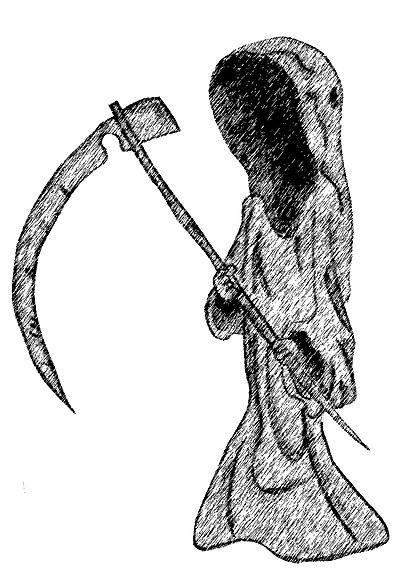Difference between revisions of "Death"
Tao alexis (talk | contribs) |
Tao alexis (talk | contribs) |
||
| Line 1: | Line 1: | ||
[[File:Death.jpg|right|420px]] | [[File:Death.jpg|right|420px]] | ||
| − | Player characters are not immune to the possibility of death, which may result from many factors: combat, disease, dehydration, necrotic damage, wounds, old age or the many possible effects resulting from the natural environment are merely the more predictable possibilities. | + | Player characters are not immune to the possibility of death, which may result from many factors: [[Combat|combat]], [[Disease|disease]], [[Dehydration|dehydration]], [[Necrotic Damage|necrotic damage]], [[Wounds|wounds]], [[Aging|old age]] or the many possible effects resulting from the natural environment are merely the more predictable possibilities. |
| − | Now and then, characters will die through no fault of their own; they may have taken every precaution, and still an unexpected roll of the die results in the character’s death. Such moments, though potentially very distressing, | + | Now and then, characters will die through no fault of their own; they may have taken every precaution, and still an unexpected roll of the die results in the character’s death. Such moments, though potentially very distressing, are acknowledged as part of the game. Indeed, the chance of death is critical to maintaining the game’s tension and momentum. Many times, the players will succeed in killing an enemy with a freakish roll; the reverse must always be possible. |
| − | Unlike the AD&D Dungeon Master’s Guide, I | + | Unlike the AD&D Dungeon Master’s Guide, I don't agree that the DM has the right to arbitrate this situation, however demoralizing it may be for the party to lose a beloved character (who might die in a manner to make them beyond resurrection, such as being buried by a mountain or incinerated in a lake of lava). Ultimately, death builds character and — in the long run — produces sweeter victories in the face of great danger. The death of a character is never the end of the game. |
| − | When a character dies, the player has the option of beginning again and rolling a new character, or attempting to | + | When a character dies, the player has the option of beginning again and rolling a new character, or attempting to restore their character from the dead through the use of [[Death's Door (spell)|death’s door]], [[Raise Dead (spell)|raise dead]], [[Resurrection (spell)|resurrection]], [[Reincarnation (spell)|reincarnation]], [[Alter Reality (spell)|alter reality]] or [[Wish (spell)|wishing]]. |
| − | See Animate Dead | + | |
| + | See Also,<br> | ||
| + | [[Animate Dead (spell)|Animate Dead]]<br> | ||
| + | [[Damage (hit points)|Damage]]<br> | ||
| + | [[Hit Points]]<br> | ||
| + | [[Undead]] | ||
Revision as of 18:53, 10 August 2020
Player characters are not immune to the possibility of death, which may result from many factors: combat, disease, dehydration, necrotic damage, wounds, old age or the many possible effects resulting from the natural environment are merely the more predictable possibilities.
Now and then, characters will die through no fault of their own; they may have taken every precaution, and still an unexpected roll of the die results in the character’s death. Such moments, though potentially very distressing, are acknowledged as part of the game. Indeed, the chance of death is critical to maintaining the game’s tension and momentum. Many times, the players will succeed in killing an enemy with a freakish roll; the reverse must always be possible.
Unlike the AD&D Dungeon Master’s Guide, I don't agree that the DM has the right to arbitrate this situation, however demoralizing it may be for the party to lose a beloved character (who might die in a manner to make them beyond resurrection, such as being buried by a mountain or incinerated in a lake of lava). Ultimately, death builds character and — in the long run — produces sweeter victories in the face of great danger. The death of a character is never the end of the game.
When a character dies, the player has the option of beginning again and rolling a new character, or attempting to restore their character from the dead through the use of death’s door, raise dead, resurrection, reincarnation, alter reality or wishing.
See Also,
Animate Dead
Damage
Hit Points
Undead
